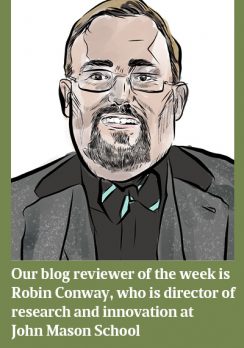Five best bets to improve teaching and learning in the year ahead
@jon_hutchinson_
When you start teaching nobody tells you that you’ll have two new years to celebrate for the rest of your life. Yet, come September, I normally have at least a dozen resolutions about what I will do better. Like January 1, some last while others quickly fall by the wayside. In this blog, Jon Hutchinson suggests five research-based teaching practices that he describes as “best bets” for improving classroom practice: low stakes quizzing, instructional coaching, sequencing curriculum, improving ratio and cognitive load theory. Each is described briefly and clearly. The author acknowledges that “translating these ideas to your own setting will require a lot of thinking”, but that sounds to me like a wise approach to any resolution. Roll on January!
EEF blog: teacher choices trials – our new approach to researching questions teachers want answers to
@ProfCoe
In this piece, Professor Rob Coe, a senior associate at the Education Endowment Foundation, outlines the thinking behind the organisation’s new series of trials. Keen to ensure their research is relevant to teachers and applied in the classroom the EEF has developed trials to investigate the choices that teachers make in their classroom every day. As Coe explains “if there are choices that make a difference, then we want to find them and evaluate their impact robustly.” The EEF is also keen to take suggestions on the questions teachers have about the kinds of choices we face. It is well worth taking a few minutes to learn about this project and to consider getting involved. These trials will benefit from widespread participation and have the potential to be of great use in the classroom.
Closing the word gap in science
@HuntingEnglish
The Oxford Education Blog has made a roaring start to the school year, posting some stimulating blogs on topics that include Roald Dahl Day 2019: 13 words of bravery, Reading: the ultimate form of active learning? and Language is all around us, not just in books. All are clear, succinct and worth taking a look at. I have chosen Alex Quigley’s piece as it offers clear, practical advice about the teaching of vocabulary. Although targeted at science, its wider application is evident. Quigley argues that whatever your subject “our students need to see these words in writing, hear their pronunciation, view and explore multiple examples.”
Motivation madness: dismantling Daniel Pink’s misapplied ideas in education
@MrGmpls
The first half of this lengthy blog explains how ideas about motivation derived from the work of Daniel Pink may not apply to education. Autonomy for workers and for students may well have dramatically different outcomes; and the impact of such ideas is often debated by teachers on eduTwitter. This blog’s real kicker comes in the second half when Jon Gustafson, a teacher in Minnesota, outlines research by Boekaerts (2010) and the American Psychological Association (2015) that is more appropriately applied to the classroom. The four key principles outlined (intrinsic motivation, challenge, expectations and setting proximal goals) are worth sharing widely with teachers and giving careful consideration to. As the author rightly concludes: “Motivation … it’s complex.”
@LeadingLearner
Stephen Tierney, the chief executive of Blessed Edward Bamber Catholic multi-academy trust, describes “teaching to the middle” as a survivalist trick. At times in every teacher’s career, giving the same quality of learning experience to those whose attainment is higher and lower than the average can be a challenge. Even at the best of times, attempts can lead to workload-unfriendly practices. Here, Tierney offers three strategies that can provide “go-to principles” in supporting all learners’ needs and overcoming some of the challenges of cognitive load. It would be nice to hear more on this topic, perhaps with some worked examples, but this acts as a nice introduction to some strategies I intend to try in my lessons.













Your thoughts